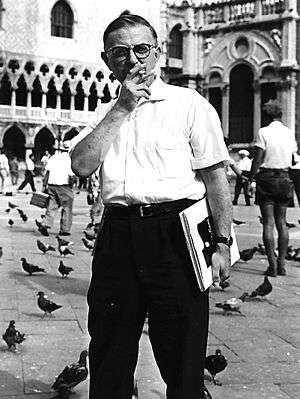Jean-Paul Sartre

Jean-Paul Charles Aymard Sartre; 21 June 1905 – 15 April 1980) was a French philosopher, playwright, novelist, political activist, biographer, and literary critic. He was one of the key figures in the philosophy of existentialism and phenomenology, and one of the leading figures in 20th-century French philosophy and Marxism.
His work has also influenced sociology, critical theory, post-colonial theory, and literary studies, and continues to influence these disciplines.
He was awarded the 1964 Nobel Prize in Literature but refused it, saying that he always declined official honors and that "a writer should not allow himself to be turned into an institution".
His most well known work is the play No Exit .
This page needs more trope entries. You can help this wiki by adding more entries or expanding current ones.
- Existentialism
- Nietzsche Wannabe: One of his primary influences was Friedrich Nietzsche himself, though Sartre was a bit more blunt about there being no God and that man was essentially nothing at birth, and that those who succeed the dead are the same way, while the dead remain little more than reminders of the past for the living.